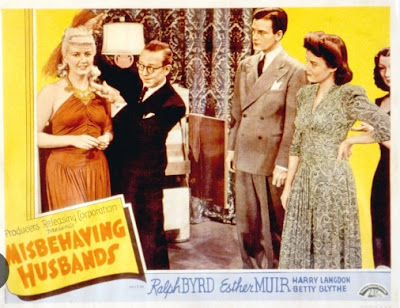Today's thrilling chapter of The Early Show runs the gamut from early talkies to '40s B-comedies to the end of the world to the end of the rein of a studio chief.
THUNDERBOLT (1929): A gangster named Thunderbolt (thanks to his infamously fatal punching skill) awaits execution on death row. Not wanting to be the only one in the hot squat, he frames nice guy Bob Moran for murder as punishment for winning the affections of his (Thunderbolt's) girlfriend Ritzie. But as he watches Bob's prison marriage to Ritzie, Thunderbolt has a change of heart. He admits to framing Bob... but is still flexing his fist for that final deadly sock in the skull.
MISBEHAVING HUSBANDS (1940): There are way too many movies that exist only because the lead characters don't take 15 seconds to clear up a silly misunderstanding. In Misbehaving Husbands, a woman is divorcing her husband because he was seen shoving a dead woman into the back of his car. Why doesn't he tell her the corpse was actually a mannequin? Because people at PRC Studios needed a two-week job.
Even for a low-budget 60-minute B-movie, Misbehaving Husbands stretches its premise to the breaking point, so you need a pro like Harry Langdon to make it work, even if professionally he had fallen several stories since his heyday almost 15 years earlier. If you're not familiar with his 1920s output, picture a middle-aged actor playing a character half his age who behaves like a seven-year-old. What was acclaimed as an "innocent" at the time now seems more like somebody on the spectrum, if not mentally ill. And somehow he usually won the love of a beautiful young woman.
But in Misbehaving Husbands, Harry's a smart, successful department store owner who can afford two servants. He puts his physical shtick to good use, but to make him amusingly eccentric rather than weird. Too, Harry's character is married to what appears to be an age-appropriate woman, although the actress, Betty Blythe, at 47, was 13 years younger than Langdon. (You're guaranteed not to see so many older, normal-looking men and women in any movie today.) And where many actresses in this kind of movie would play the role strictly for yocks, Blythe's reactions to her husband's alleged misbehavior are dead serious, occasionally giving the movie an unexpected depth. Kudos to director William "One Take" Beaudine for handling both the comedy and drama equally well.
Call me nuts, but Misbehaving Husbands is funnier than many of Langdon's "classic" silents. The uproarious scene where a nosey woman mistakes Harry straightening out a mannequin on a bed for foreplay makes one regret he never became a member of Preston Sturges' stock company. For a comedy that will never be considered a classic, Misbehaving Husbands gave me more genuine laughs than many that are.
BONUS POINTS: In the lobby card above on the left, you can see the movie debut of a young actor named Byron Barr. Two years later, Warner Brothers changed his name to Gig Young.
SHADOW ON THE WALL (1950): David Starrling is understandably upset when
learning his second wife, Celia, is having an affair with his best friend Crane Weymouth. As David approaches Celia threateningly, she knocks him unconscious with a hand mirror. (This guy must have a soft head.) Before you can say "sibling rivalry" Celia's sister Dell -- the fiancée of Crane Weymouth -- enters their apartment and shoots her to death before planting the gun in David's hand and running out the door. David is arrested, found guilty of murder, and put on death row. Dell is more or less relieved how things turned out, until learning that David's young daughter Susan (from his first marriage) is now in a hospital, suffering from amnesia after witnessing the shooting. As Dr. Caroline Canford gets closer to reviving the girl's memory, Dell will stop at nothing, and I mean nothing, to prevent her cure. No wonder why step-relatives have a bad reputation.
You can tell Louis B. Mayer was losing control of MGM to production head Dore Schary; there is no way the studio would have produced a movie like Shadow on the Wall even five years earlier. Shooting an evil step-sister was acceptable -- but slipping poison into a little girl's glass of chocolate milk, trying to drown her in a tub while she was sedated -- and, when those tricks don't work, adopting her so she can knock off the kid in private? Judy Garland and Mickey Rooney this was not. Not being a fan of child-in-danger stories, even I had put off watching this, despite having it on my DVR for months.
I'm glad I ran out of excuses for avoiding it, if only for two of its stars. Having vague memories of Ann Sothern as a sitcom actress from my youth, it was a real change of pace to see her here as Dell, the perpetrator of femicide and attempted infanticide. You kind of feel sorry for her early on -- her sister Celia essentially stole everything Dell had when they were growing up, from clothes to boyfriends -- but letting David take the rap is taking things too far. Nancy Davis (before taking the name of husband-to-be Ronald Reagan) is actually credible as the kindly Dr. Cranford. Credible in that from what I've read about her, Nancy wasn't as kind to her own kids as she is to as Gigi Perreau (as Susan) here.
BONUS POINTS: When Dell is at the beauty parlor following the murder, she hallucinates the hairdryer being slipped over head for the electric chair. It wasn't meant to be funny but, damn, I can't be the only one these days who laughed out loud.
*************
.jpg)
.jpg)






No comments:
Post a Comment